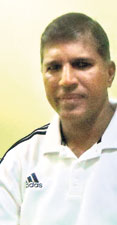William Webb Ellis, a soccer player, broke rules by picking up the ball and running with it when he was on the losing side during a game at Rugby School, England in 1823. This gave birth to rugby football where an oval shaped ball was used. Very soon the game became very popular in England and spread throughout Great Britain and to other countries like Canada, USA, Italy, Romania, Japan, Soviet Union, Fiji, Argentina and 90 other countries including Sri Lanka.
Of course it is a well known fact about the strength, speed and stamina of rugby nations such as New Zealand, Australia, England and France.
 |
| Dilroy Fernando |
Recently Sri Lanka celebrated 100 years of rugby. The game was brought here by British planters and for a while thrived in the Up Country with Dimbula, Dickoya, Uva and Kandy holding sway. Sadly Dimbula, Dickoya and Uva are out of the reckoning now and Kandy SC are holding their own against tremendous opposition.
There was a spark in rugby recently when Sri Lanka emerged champions at a five nation competition in Singapore. Pundits began to shout that rugby is on the upsurge once again, after all were we not Asian runners-up to Japan in 1974 when Indrajit Coomaraswamy captained the side? There was also a time when Sri Lanka won the Plate at the Hong Kong Sevens under the leadership of Hisham Abdeen.
But never in the annals of the game have there been problems besotted in a tiny country like ours. The referees cry foul that they are not paid enough and the controlling body is conducting its affairs allegedly in an unsatisfactory manner while experienced campaigners such as Y.C. Chang, Malik Samarawickrema, Anton Benedict, Michael Jayasekera, Gamini Fernando, Ananda Sarnapala and others of repute are kicking their heels on the side lines.
It is with these thoughts that I ventured out to meet Dilroy Fernando, President of the Sri Lanka Rugby Referees Society, International Rugby Board (IRB) Evaluator and Educator at CR&FC Grounds in Longden Place. Dilroy is also Director of Sports at the CR&FC and trains youngsters at Longdon Place. These young ones range from the very rich to the sons of three-wheeler drivers and others not so affluent in and around the CR&FC.
Dilroy has just returned from refereeing a rugby tournament in Dubai, in the United Arab Emirates organized by the Lanka Lions.
Dilroy is also a leading rugby referee in Sri Lanka and has refereed 17 Bradby Shield games between Royal and Trinity.
The main problem that the Rugby Referees Society is faced is that they say are paid peanuts for the job that they do and this is causing quite a lot of heartburn amongst the ‘men in the middle’. In comparison to a top schools rugby coach or trainer who draws a salary of about Rs. 100,000 to Rs. 80,000 a month.
Dilroy Fernando did not want to discus the payments of referees saying that the game cannot do without them and something should be done to better their prospects. The top level evaluators in the game today include Dilroy Fernando, Vimal Perera, Mahinda Jayawardena and Metha Abeygunewardena.
Dilroy is a proud product of Isipathana MV. He has captained the sides at almost all age levels and captained the First XV side in 1982. He turned out for the Havelocks’s Sevens team under Angelo Wickramaratne when he was 18 years and crossed over to the CR&FC and had a successful season under C.P.P. Abeygunewardena. He also represented the Colombo Clubs in the annual Capper Cup game against Up Country led by Lanil Tennekoon which game the Colombo Clubs won convincingly.
Speaking on rugby matters Dilroy said that the new rules of the IRB were implemented this year and these rules opened out the game more making the game also more spectacular.
Speaking about rugby in the region he said that rugby is fast catching up in India especially amongst the women in Delhi, Mumbai and the Army and Air Force teams. “It is gratifying to note that rugby is now being played in 26 countries in the region,” concluded Dilroy. |


